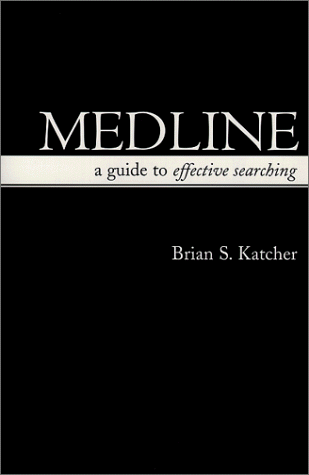
Synopsis
[This first edition was extensively revised and updated in a second edition (2006): ISBN 0967344514 ... the second edition is available on Amazon.]
This concise and clearly written book will make your MEDLINE searches more productive. Any health professional will benefit from reading this book, which explains the basics of formulating searches, shows how to put the main indexing elements in MEDLINE to best use, illustrates the importance of Medical Subject Headings (MeSH), provides guidance on framing questions, and backs everything up with practical examples. Includes a glossary of all MeSH used in the book and two appendices.
"synopsis" may belong to another edition of this title.
About the Author
Brian S. Katcher, Pharm.D., is the author of Prescription Drugs: An Indispensable Guide for People Over 50 and was one of the founding editors of Applied Therapeutics: The Clinical Use of Drugs, a textbook used in training clinical pharmacists. Dr. Katcher is the Public Health Pharmacist for the Community Health Promotion & Disease Prevention Branch of the San Francisco Department of Public Health and Associate Clinical Professor of Pharmacy at the University of California San Francisco.
His main work is in developing community-based, environmentally-focused primary prevention activities. Toward that end, he is interested in assessments of population health that will be useful to communities. He is a member of the San Francisco Burden of Disease & Injury Work Group, which is pioneering the first municipal application of the Harvard/WHO Global Burden of Disease approach toward assessments of population health. This group has recently completed an analysis of premature mortality in San Francisco and is currently working on a complementary assessment of morbidity.
His interest in promoting the most effective use of MEDLINE supports a larger vision of evidence-based health policy and practice.
"About this title" may belong to another edition of this title.
Other Popular Editions of the Same Title
Search results for MEDLINE: A Guide to Effective Searching
MEDLINE: A Guide to Effective Searching
Seller: BookHolders, Towson, MD, U.S.A.
Condition: Good. [ No Hassle 30 Day Returns ][ Ships Daily ] [ Underlining/Highlighting: NONE ] [ Writing: NONE ] [ Edition: First ] Publisher: Ashbury Press Pub Date: 8/25/1999 Binding: Paperback Pages: 160 First edition. Seller Inventory # 6467024
MEDLINE: A Guide to Effective Searching
Seller: HPB-Red, Dallas, TX, U.S.A.
paperback. Condition: Good. Connecting readers with great books since 1972! Used textbooks may not include companion materials such as access codes, etc. May have some wear or writing/highlighting. We ship orders daily and Customer Service is our top priority! Seller Inventory # S_440417241
Medline: A Guide to Effective Searching
Seller: AwesomeBooks, Wallingford, United Kingdom
Paperback. Condition: Very Good. Medline: A Guide to Effective Searching This book is in very good condition and will be shipped within 24 hours of ordering. The cover may have some limited signs of wear but the pages are clean, intact and the spine remains undamaged. This book has clearly been well maintained and looked after thus far. Money back guarantee if you are not satisfied. See all our books here, order more than 1 book and get discounted shipping. . Seller Inventory # 7719-9780967344508
Buy Used
Quantity: 1 available
Medline: A Guide to Effective Searching
Seller: Bahamut Media, Reading, United Kingdom
Paperback. Condition: Very Good. Shipped within 24 hours from our UK warehouse. Clean, undamaged book with no damage to pages and minimal wear to the cover. Spine still tight, in very good condition. Remember if you are not happy, you are covered by our 100% money back guarantee. Seller Inventory # 6545-9780967344508
Buy Used
Quantity: 1 available

